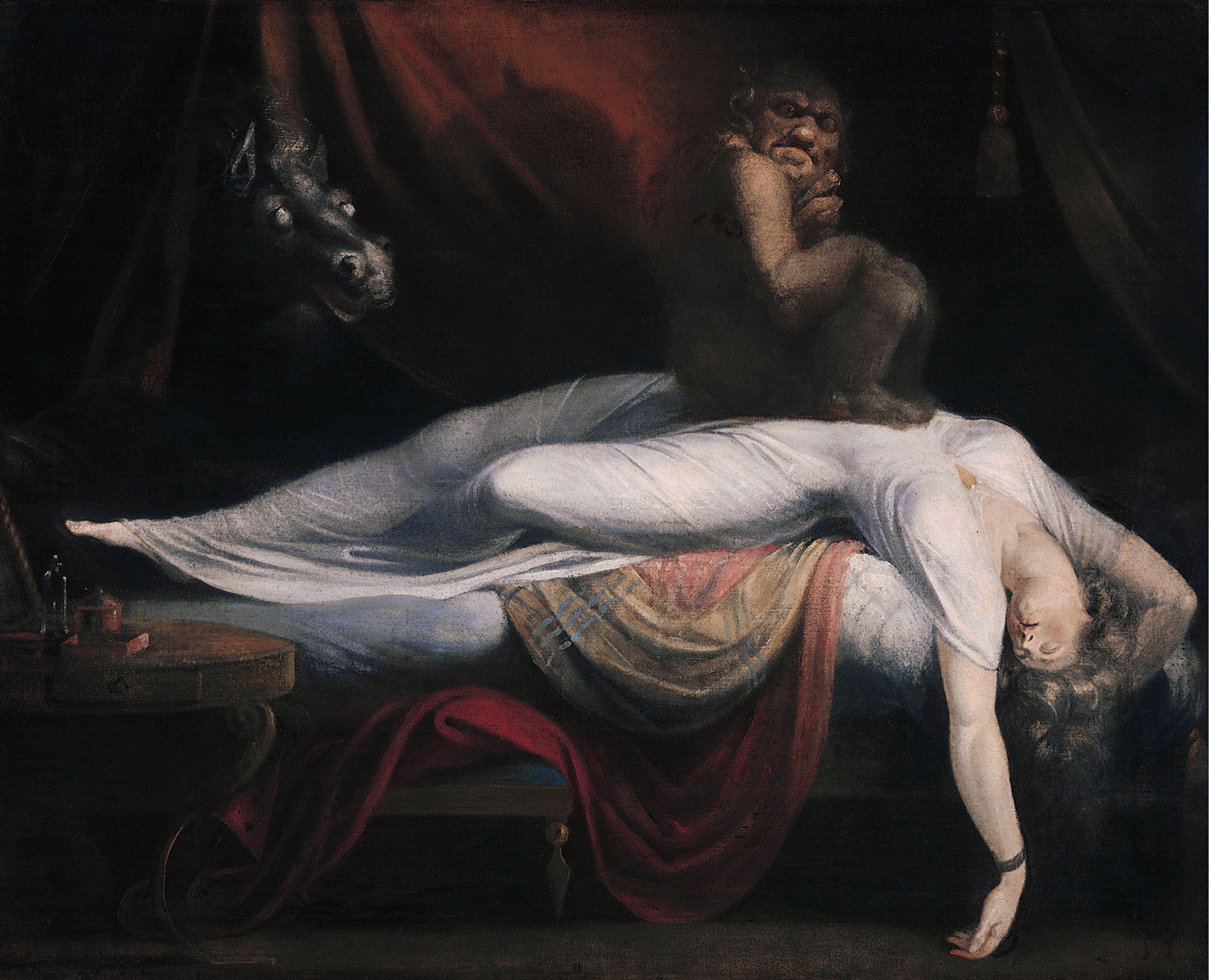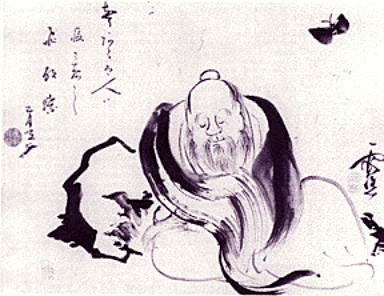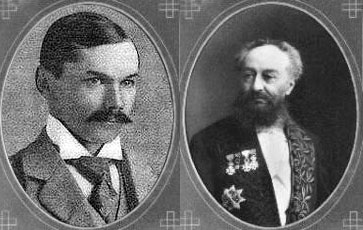|
Hypnopompia
Hypnopompia (also known as hypnopompic state) is the state of consciousness leading out of sleep, a term coined by the psychical researcher Frederic Myers. Its mirror is the hypnagogic state at sleep onset; though often conflated, the two states are not identical and have a different phenomenological character. Hypnopompic and hypnagogic hallucinations are frequently accompanied by sleep paralysis, which is a state wherein one is consciously aware of one's surroundings but unable to move or speak. Hallucinations Hallucinations are commonly understood as "sensory perceptions that occur in the absence of an objective stimulus". As this definition implies, though, like dreams, most hallucinations are visual, they can encompass a broader range of sensory experience. Auditory hallucinations are thus also common: "patients can hear simple sounds, structured melodies or complete sentences". Slightly less common but not unheard of are " somesthetic" hallucinations involving the sens ... [...More Info...] [...Related Items...] OR: [Wikipedia] [Google] [Baidu] |
Hypnagogic
Hypnagogia is the experience of the transitional state from wakefulness to sleep: the ''hypnagogic'' state of consciousness, during the Sleep onset, onset of sleep. Its opposite state is described as the transitional state from sleep into wakefulness. Mental phenomena that may occur during this "threshold consciousness" phase include hypnagogic hallucinations, lucid thought, exploding head syndrome, lucid dreaming, and sleep paralysis. The latter two phenomena are themselves separate sleep conditions that are sometimes experienced during the hypnagogic state. Definitions The word ''hypnagogia'' is sometimes used in a restricted word sense, sense to refer to the onset of sleep, and contrasted with ''hypnopompia'', Frederic William Henry Myers, Frederic Myers's term for waking up. However, ''hypnagogia'' is also regularly employed in a more general sense that covers both falling asleep and waking up. Indeed, it is not always possible in practice to assign a particular episode of any ... [...More Info...] [...Related Items...] OR: [Wikipedia] [Google] [Baidu] |
Hallucination
A hallucination is a perception in the absence of an external stimulus that has the qualities of a real perception. Hallucinations are vivid, substantial, and are perceived to be located in external objective space. Hallucination is a combination of 2 conscious states of brain wakefulness and REM sleep. They are distinguishable from several related phenomena, such as dreaming ( REM sleep), which does not involve wakefulness; pseudohallucination, which does not mimic real perception, and is accurately perceived as unreal; illusion, which involves distorted or misinterpreted real perception; and mental imagery, which does not mimic real perception, and is under voluntary control. Hallucinations also differ from "delusional perceptions", in which a correctly sensed and interpreted stimulus (i.e., a real perception) is given some additional significance. Many hallucinations happen also during sleep paralyses. Hallucinations can occur in any sensory modality—visual, auditory, olfa ... [...More Info...] [...Related Items...] OR: [Wikipedia] [Google] [Baidu] |
State Of Consciousness
Consciousness, at its simplest, is sentience and awareness of internal and external existence. However, the lack of definitions has led to millennia of analyses, explanations and debates by philosophers, theologians, linguisticians, and scientists. Opinions differ about what exactly needs to be studied or even considered consciousness. In some explanations, it is synonymous with the mind, and at other times, an aspect of mind. In the past, it was one's "inner life", the world of introspection, of private thought, imagination and volition. Today, it often includes any kind of cognition, experience, feeling or perception. It may be awareness, awareness of awareness, or self-awareness either continuously changing or not. The disparate range of research, notions and speculations raises a curiosity about whether the right questions are being asked. Examples of the range of descriptions, definitions or explanations are: simple wakefulness, one's sense of selfhood or soul explored ... [...More Info...] [...Related Items...] OR: [Wikipedia] [Google] [Baidu] |
John Henry Fuseli - The NightmareFXD
John is a common English name and surname: * John (given name) * John (surname) John may also refer to: New Testament Works * Gospel of John, a title often shortened to John * First Epistle of John, often shortened to 1 John * Second Epistle of John, often shortened to 2 John * Third Epistle of John, often shortened to 3 John People * John the Baptist (died c. AD 30), regarded as a prophet and the forerunner of Jesus Christ * John the Apostle (lived c. AD 30), one of the twelve apostles of Jesus * John the Evangelist, assigned author of the Fourth Gospel, once identified with the Apostle * John of Patmos, also known as John the Divine or John the Revelator, the author of the Book of Revelation, once identified with the Apostle * John the Presbyter, a figure either identified with or distinguished from the Apostle, the Evangelist and John of Patmos Other people with the given name Religious figures * John, father of Andrew the Apostle and Saint Peter * Pope Joh ... [...More Info...] [...Related Items...] OR: [Wikipedia] [Google] [Baidu] |
Lucid Dreams
A lucid dream is a type of dream in which the dreamer becomes aware that they are dreaming while dreaming. During a lucid dream, the dreamer may gain some amount of control over the dream characters, narrative, or environment; however, this is not actually necessary for a dream to be described as lucid. Lucid dreaming has been studied and reported for many years. Prominent figures from ancient to modern times have been fascinated by lucid dreams and have sought ways to better understand their causes and purpose. Many different theories have emerged as a result of scientific research on the subject and have even been shown in pop culture. Further developments in psychological research have pointed to ways in which this form of dreaming may be utilized as a form of sleep therapy. Etymology The term ''lucid dream'' was coined by Dutch author and psychiatrist Frederik van Eeden in his 1913 article ''A Study of Dreams'', though descriptions of dreamers being aware that they are drea ... [...More Info...] [...Related Items...] OR: [Wikipedia] [Google] [Baidu] |
Sleep Physiology
Sleep is a sedentary state of mind and body. It is characterized by altered consciousness, relatively inhibited Perception, sensory activity, reduced muscle activity and reduced interactions with surroundings. It is distinguished from wakefulness by a decreased ability to react to stimulus (physiology), stimuli, but more reactive than a coma or disorders of consciousness, with sleep displaying different, active brain patterns. Sleep occurs in sleep cycle, repeating periods, in which the body alternates between two distinct modes: REM sleep and non-rapid eye movement sleep, non-REM sleep. Although REM stands for "rapid eye movement", this mode of sleep has many other aspects, including virtual paralysis of the body. dream, Dreams are a succession of images, ideas, emotions, and sensations that usually occur involuntarily in the mind during certain stages of sleep. During sleep, most of the human body, body's systems are in an anabolic state, helping to restore the Immunity (medi ... [...More Info...] [...Related Items...] OR: [Wikipedia] [Google] [Baidu] |
Sleep Disorders
A sleep disorder, or somnipathy, is a medical disorder of an individual's sleep patterns. Some sleep disorders are severe enough to interfere with normal physical, mental, social and emotional functioning. Polysomnography and actigraphy are tests commonly ordered for diagnosing sleep disorders. Sleep disorders are broadly classified into dyssomnias, parasomnias, circadian rhythm sleep disorders involving the timing of sleep, and other disorders including ones caused by medical or psychological conditions. When a person struggles to fall asleep and/or stay asleep with no obvious cause, it is referred to as insomnia, the most common sleep disorder. Others include sleep apnea, narcolepsy and hypersomnia (excessive sleepiness at inappropriate times), sleeping sickness (disruption of sleep cycle due to infection), sleepwalking, and night terrors. Sleep disruptions can be caused by various issues, including teeth grinding ( bruxism) and night terrors. Management of sleep disturbances ... [...More Info...] [...Related Items...] OR: [Wikipedia] [Google] [Baidu] |
Lucid Dream
A lucid dream is a type of dream in which the dreamer becomes aware that they are dreaming while dreaming. During a lucid dream, the dreamer may gain some amount of control over the dream characters, narrative, or environment; however, this is not actually necessary for a dream to be described as lucid. Lucid dreaming has been studied and reported for many years. Prominent figures from ancient to modern times have been fascinated by lucid dreams and have sought ways to better understand their causes and purpose. Many different theories have emerged as a result of scientific research on the subject and have even been shown in pop culture. Further developments in psychological research have pointed to ways in which this form of dreaming may be utilized as a form of sleep therapy. Etymology The term ''lucid dream'' was coined by Dutch author and psychiatrist Frederik van Eeden in his 1913 article ''A Study of Dreams'', though descriptions of dreamers being aware that they are drea ... [...More Info...] [...Related Items...] OR: [Wikipedia] [Google] [Baidu] |
False Awakening
A false awakening is a vivid and convincing dream about awakening from sleep, while the dreamer in reality continues to sleep. After a false awakening, subjects often dream they are performing daily morning routine such as showering, cooking, cleaning, eating, and using the bathroom. False awakenings, mainly those in which one dreams that they have awoken from a sleep that featured dreams, take on aspects of a double dream or a dream within a dream. A classic example is the double false awakening of the protagonist in Gogol's ''Portrait'' (1835). Related concepts Lucidity A false awakening may occur following a dream or following a lucid dream (one in which the dreamer has been aware of dreaming). Particularly, if the false awakening follows a lucid dream, the false awakening may turn into a " pre-lucid dream",Green, C. (1968). ''Lucid Dreams''. London: Hamish Hamilton. that is, one in which the dreamer may start to wonder if they are really awake and may or may not come to the ... [...More Info...] [...Related Items...] OR: [Wikipedia] [Google] [Baidu] |
Schizophrenia
Schizophrenia is a mental disorder characterized by continuous or relapsing episodes of psychosis. Major symptoms include hallucinations (typically hearing voices), delusions, and disorganized thinking. Other symptoms include social withdrawal, decreased emotional expression, and apathy. Symptoms typically develop gradually, begin during young adulthood, and in many cases never become resolved. There is no objective diagnostic test; diagnosis is based on observed behavior, a history that includes the person's reported experiences, and reports of others familiar with the person. To be diagnosed with schizophrenia, symptoms and functional impairment need to be present for six months (DSM-5) or one month (ICD-11). Many people with schizophrenia have other mental disorders, especially substance use disorders, depressive disorders, anxiety disorders, and obsessive–compulsive disorder. About 0.3% to 0.7% of people are diagnosed with schizophrenia during their lifetime. In 2 ... [...More Info...] [...Related Items...] OR: [Wikipedia] [Google] [Baidu] |
Parkinson's Disease
Parkinson's disease (PD), or simply Parkinson's, is a long-term degenerative disorder of the central nervous system that mainly affects the motor system. The symptoms usually emerge slowly, and as the disease worsens, non-motor symptoms become more common. The most obvious early symptoms are tremor, rigidity, slowness of movement, and difficulty with walking. Cognitive and behavioral problems may also occur with depression, anxiety, and apathy occurring in many people with PD. Parkinson's disease dementia becomes common in the advanced stages of the disease. Those with Parkinson's can also have problems with their sleep and sensory systems. The motor symptoms of the disease result from the death of cells in the substantia nigra, a region of the midbrain, leading to a dopamine deficit. The cause of this cell death is poorly understood, but involves the build-up of misfolded proteins into Lewy bodies in the neurons. Collectively, the main motor symptoms are also known as ... [...More Info...] [...Related Items...] OR: [Wikipedia] [Google] [Baidu] |
Dementia
Dementia is a disorder which manifests as a set of related symptoms, which usually surfaces when the brain is damaged by injury or disease. The symptoms involve progressive impairments in memory, thinking, and behavior, which negatively affects a person's ability to function and carry out everyday activities. Aside from memory impairment and a disruption in thought patterns, the most common symptoms include emotional problems, difficulties with language, and decreased motivation. The symptoms may be described as occurring in a continuum over several stages. Consciousness is not affected. Dementia ultimately has a significant effect on the individual, caregivers, and on social relationships in general. A diagnosis of dementia requires the observation of a change from a person's usual mental functioning, and a greater cognitive decline than what is caused by normal aging. Several diseases and injuries to the brain, such as a stroke, can give rise to dementia. However, th ... [...More Info...] [...Related Items...] OR: [Wikipedia] [Google] [Baidu] |








